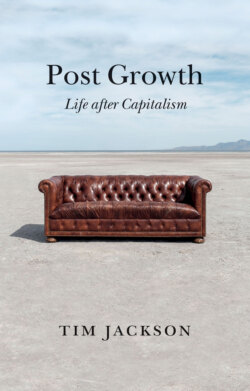Читать книгу Post Growth - Tim Jackson - Страница 10
Myth matters
ОглавлениеEvery culture, every society, clings to a myth by which it lives. Ours is the myth of growth. For as long as the economy continues to expand, we feel assured that life is getting better. We believe that we are progressing – not just as individuals but as a society. We convince ourselves that the world tomorrow will be a brighter, shinier place for our children and for their children. When the opposite happens, disillusionment beckons. Collapse threatens our stability. Darkness looms on the horizon. And these demons – real as they may be in an economy dependent so entirely on growth – are rendered even more powerful by the loss of faith in our core sustaining narrative. The myth of growth.
I am using the word ‘myth’ here in the kindest possible sense. Myth matters. Narratives sustain us. They create our thought-worlds and shape our social conversations. They legitimize political power and underwrite the social contract. To pledge allegiance to a myth is not inherently wrong. We all do it, in some form or another, implicitly or explicitly. But to acknowledge the power of myth is not always to condone it. Sometimes myths work for us. Sometimes they work against us.
When they abide, it is for a reason. Economic growth has brought extraordinary affluence. It has lifted millions out of poverty. For those rich enough and lucky enough, it has enabled lives of unbelievable comfort and complexity and luxury. It’s delivered opportunities our ancestors couldn’t possibly have imagined. It’s facilitated the dream of social progress. Nutrition, medicine, shelter, mobility, flight, connectivity, entertainment: these are amongst the manifold fruits of economic growth.
But the massive explosion of economic activity has also wreaked unparalleled havoc on the natural world. We are losing species faster than at any time in human history. Forests are decimated. Habitats are lost. Agricultural land is threatened by economic expansion. Climate instability is undermining our security. Fires consume whole swathes of land. Sea levels rise. Oceans acidify. The affluence we aspire to has been purchased at an unpayable price. The myth that sustained us is in the process of undoing us.
My aim here is not to rehearse these impacts or document their damages. There are many excellent accounts already available. ‘For more than thirty years, the science has been crystal clear,’ as Greta Thunberg reminded the UN Climate Conference in 2019. Her words became a cultural meme. They even spawned artistic and musical interpretations that reach beyond audiences scientists ever could. The hard evidence behind them resides in countless pages of painstaking work.7
I intend instead to pick up on her deeper challenge. Beyond the ‘fairytales of economic growth’ lies a world of complexity that demands our attention. Those fairytales are coded into the guidance manual of the modern economy. They’ve been there for decades. They continue to distort our understanding of social progress and prevent us from thinking more deeply about the human condition.
The broad thesis of this book is that good lives do not have to cost the earth. Material progress has changed our lives – in many ways for the better. But the burden of having can obscure the joy of belonging. The obsession with producing can distort the fulfilment of making. The pressure of consuming can undermine the simple lightness of being. Recovering prosperity is not so much about denial as about opportunity.
This book addresses the conditions under which we thrive. It seeks out our potential to live better, fuller, more fulfilling and more sustainable lives. The end of growth is not the end of social progress. To dethrone material expansion is not to give up on human prosperity. Another (better) world is possible. This much has been obvious at least since Kansas.
By the time Kennedy arrived at the ‘Phog’ Allen Fieldhouse, home to the University of Kansas basketball team, the atmosphere was electric. Well over twenty thousand people had crowded into the arena: students and staff, journalists and commentators, spilling onto the yellow court, leaving only a tiny circle for Kennedy to stand at a wooden lectern, crammed with microphones.
He opened with what must have been a more or less spontaneous joke. ‘I’m really not here to make a speech,’ he quipped. ‘I’ve come because I came from Kansas State and they want to send their love to all of you. They did. That’s all they talk about over there, how much they love you.’ The rivalry between the two top Kansas universities was legendary. The ‘Sunflower Showdown’ between the two basketball teams had played out fiercely since 1907. The arena exploded in laughter. They loved him already. Enough, apparently, for him to offer them a little macroeconomics.8
